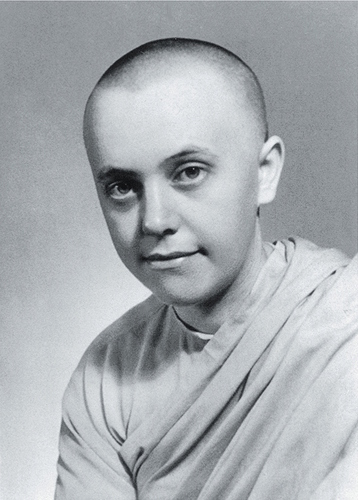An internet tangent this afternoon that started with viewing some old images of the Parappuduwa Nuns’ Monastery in Sri Lanka, quickly turned into a full-fledged exploration of the monks whom I affectionally dub the ‘Ñāṇas’ (e.g. Ñāṇatiloka, Ñāṇamoli, Ñāṇavīra, Ñāṇaponika, Ñāṇavimala, etc.). In reading about Ven. Ñāṇavīra, of whom I somehow always end up reading about the longest, I came across this article, which features a striking image of a woman I had never seen before:
My first thought was, of course, ‘Oh! A Nun! ![]() ’. And my second thought was, ‘who in the world is that?!’ Now, I don’t mean to brag (or sound tremendously creepy), but there are very few Western Theravada nuns that I haven’t at least heard of, and so to see a new face was exciting.
’. And my second thought was, ‘who in the world is that?!’ Now, I don’t mean to brag (or sound tremendously creepy), but there are very few Western Theravada nuns that I haven’t at least heard of, and so to see a new face was exciting.
This is Sister Vajirā (Hannelore Wolf), a German woman born in 1928 who would eventually become a dasa sil mata in Sri Lanka in 1955. Vajirā was by all accounts a fiery person, Ñāṇavīra once describing her as, “an extremely passionate and self-willed person, with strong emotions, and, apparently, something of a visionary.” (From the Buddhist Books Blog article linked above).
Indeed, in his biography of Vajirā, the scholar Hellmuth Hecker writes,
…Sister Vajirā found it non-ascetic when a nun was earning money and wrote a critical memorandum in English with her views about the defects of the nun’s life…After the polemic pamphlet had been sent out, Vajirā made herself many enemies. They took offence that the stranger, who was living on the alms food of the country, knew everything better. The nuns, for example, switched off the power supply to her kuti and turned a cold shoulder on her. When I got to hear about it, I approached Ven. Nyānaponika for help, who made an extra effort and went to her and mediated with a lot of difficulties, so that at least she could remain at Biyagāma, now only tolerated with Buddhist equanimity.
Perhaps the most fascinating part of Vajirā’s life is her relationship with Ñāṇavīra, to whom she wrote many letters over the course of a couple of years. It seems that Ñāṇavīra was in some sense a guide and teacher to Vajirā, elucidating certain points of the Dhamma. It is during this exchange of letters that it is claimed (allegedly) that Vajirā became a sotāpanna, the BBB article stating,
Shortly before the 21st of January, Sister Vajira, guided by Ñanavira’s letters and Notes, experienced an ecstatic breakthrough culminating in her attainment of sotapatti—she, too, became a sotapanna. To Ñanavira she wrote: “I have lost a dimension of thought, at least to the degree [necessary] to grasp this matter…”[6] In reference to this curious statement, Ñanavira remarked to a supporter “I am unable to see that it could have been written by a puthujjana, even if he were trying to deceive. It would never occur to him to add the part about ‘losing a dimension of thought.’ One must actually have had the experience to know how exactly this describes it.”
What follows in Vajirā’s life is not a very happy story – following this attainment she has a mental breakdown and is eventually forced to return to Germany. One account from Hecker’s biography gives a profound example of the kind of fiery person Vajirā must have been,
“We went on the 6th and brought sister to Colombo. She ran away in the night from Mrs. Nimalasuriya’s house and was walking along the streets, several followed her and with great difficulty put her into a car. Dr. Nimalasuriya, Dr. Shelton Fernando and their wives along with me forced her into a car and took her to Sulamin Hospital at 2 a.m. … Now she is much better after the treatment; there also, twice she has jumped through the window and roamed about, but the nurse and attendants managed to bring her back. Now Sister Vajirā says that she wants to get into a saree and at times says that she wants to go back to Germany. We are now wondering what to do with her. By this same post I am writing to Rev. Nyānaponika also.” [My italics]
Something that I find incredibly interesting is that Vajirā (for better or for worse), was known by many very important Western monastics living in Sri Lanka at the time. Including at least several of the Ñāṇas, who were fetched at various times to help deal with this German nun who was causing a kerfuffle. Hecker even writes, hilariously, that “…[she] once visited Sister Upalavanna, but the two women from Hamburg did not get along with each other.”
After her return to Germany, Vajirā leaves behind Buddhism almost entirely, corresponding only very sporadically with Hecker, and later indirectly with Samanera Bodhesako who would write Clearing the Path, the collected works of Ñāṇavīra. In learning about Vajirā’s story, it is also interesting to me that two somewhat troubled people (Vajirā and Ñāṇavīra - the latter of whom would famously commit suicide) had formed a kind of relationship with one another, and bodes the question of just how healthy that relationship was, particularly with regards to Dhamma. Her story leads me to reason to ‘choose your kalyāṇamittā well.’
Sister Vajirā was a tremendously interesting individual who, by all accounts, led a difficult and tumultuous life. Nevertheless, her story inspires me to learn from her mistakes and to have faith in the Dhamma, even when the path becomes more murky.
May Sister Vajirā always be well, happy, and peaceful, and may she attain nibbāna. ![]()

